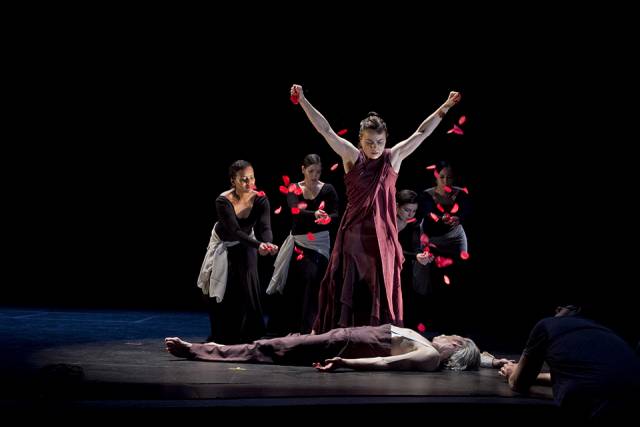
 Sophocles’ tragedy Antigone pairs marvelously with the intensely passionate art form known as flamenco in Noche Flamenca’s production of Antigona, starring the enormously talented Soledad Barrio. Playing at the West Park Presbyterian Church, an interesting choice given the many ancient gods worshiped and prayed to in the play, Antigona’s venue may not be air-conditioned, but the dancing and music are enough to give you chills. Martin Santangelo adapted and directed the perfect story to be told through flamenco.
Sophocles’ tragedy Antigone pairs marvelously with the intensely passionate art form known as flamenco in Noche Flamenca’s production of Antigona, starring the enormously talented Soledad Barrio. Playing at the West Park Presbyterian Church, an interesting choice given the many ancient gods worshiped and prayed to in the play, Antigona’s venue may not be air-conditioned, but the dancing and music are enough to give you chills. Martin Santangelo adapted and directed the perfect story to be told through flamenco.
Spoken and sung mostly in Spanish (a screen translates the text via supertitles), the story of Antigona begins with the titular character’s father, Oedipus (Carlos Perez Vega), King of Thebes, who ends up killing his father and marrying his mother, Jocasta (Xianix Barrera). Antigona, loyal to the very end, follows her father into exile. After Oedipus’ death, his two sons, Eteocles (Ray F. Davis) and Polyneices (Pepito Jimenez), battle over who will claim his throne. When they kill each other, Creon (Manuel Gago), Oedipus’ brother, becomes king and orders that Polyneices will not be buried, since he began the war while Eteocles defended the city. Antigona defies this decree and buries him anyway, believing she must honor her dead brother. Creon sentences her to death but she hangs herself before he can get to her.
It’s heavy stuff indeed, made more so by dark costumes (Soledad Barrio), dark lighting and overwrought singing. The use of masks (Sydney Moffat) also adds a chilling effect. The gorgeous dancing, punctuated by the staccato of the guitar (Eugenio Iglesias and Salva de Maria), the beat of the percussion (David Rodriguez) and the insistent stomping of the hard soled shoes, is all due to the electrifying work of Ms. Barrio, who choreographed the play. Her movements are in a class of their own, as she elegantly shuffles across the stage, grabbing her skirts for a quick twirl and moving her legs impossibly fast, her feet making rhythms like a drum. Juan Ogalla as Haemon, Antigona’s lover, is almost her equal, his dancing graceful, impassioned, and moving. The dance they perform together is enough to make hearts swoon.
Other performers stand out. Marina Elana as Ismene, Antigona’s sister, delivers the only English of the night, narrating a part of the story in a sort of sassy, Valley Girl manner of speaking. The main Master of Ceremonies, Emilio Florido, tells the bulk of the story in a half singing, half speaking narration. Pepe el Bocadillo plays Tiresias, the blind seer who predicts everything that happens, his voice soaring clear through the rafters. The complementary play between the musicians and the dancers helps to tell the story, and each lets the other shine through in all the right places.
Antigona is a play to be seen and experienced, but most of all, to be felt. If you let it wash over you like a wave, you might just hear Sophocles in the background, clapping his hands in time to the rhythm.